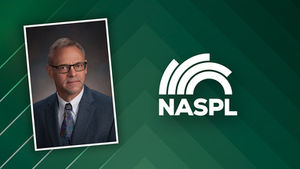Sue Nelson
- Insights Online
- Oct 21, 2025
- 6 min read
Chief Information Officer, Minnesota Lottery
By Insights Online
Published October 21, 2025

The transition to a government-operated lottery from a private corporate behemoth can be daunting to a business professional, but it can also be rewarding. There’s no doubt that a lot of things need to be learned, and past experiences may or may not get tossed out the door. Yet in the fast-paced world of information technology, applying private industry expertise to the needs of a lottery can do wonders. It can energize the individual and revolutionize the lottery. That’s been the experience in the 2½ years since Sue Nelson accepted the role of Chief Information Officer at the Minnesota Lottery.
“Sue brings a thoughtful, strategic approach to everything she does at the Minnesota Lottery,” says Executive Director Adam Prock. “She has helped transform our IT operations by tackling complex challenges with clarity and focus. Her leadership has made real difference. She knows how to prioritize what matters and build solutions that set us up for long-term success.”
ADVERTISEMENT
Sue found her way to the Minnesota Lottery in May 2023, after some 22 years with 3M in the areas of software development, quality assurance, business development, and digital transformation. “One of my favorite things about 3M is that they had multiple businesses, so that’s why my background is so varied.”
Because she’s a Six Sigma Black Belt, she’s an expert in business process improvement. “For years, many companies implemented Six Sigma in their manufacturing sites, and Lean Six Sigma to improve processes, eliminate waste in processes, and improve products. I believe in reviewing processes and continually improving them using Lean Six Sigma – and common sense! It all helps streamline any business including lotteries.” Therefore, it’s not surprising that she hit the ground running at the Minnesota Lottery.
Yet she was surprised to discover that some parts of the agency’s technology stack were more outdated than expected – largely due to long-term contracting practices common within the lottery industry. At the same time, this presents a timely opportunity to reassess and modernize systems to better support the agency’s evolving needs. “Technology changes fast, and there are areas that require absolute security. Keeping legacy equipment in use can ask for trouble.” She was also surprised that so many things are covered by just one contract. But she’s also realistic and knows that even after more than two years at the Lottery, she acknowledges that she still has a lot to learn about the business.
A believer in the advantages of artificial intelligence (AI), Sue knows its continued improvements enable lotteries to do different things and helps employees do their jobs better. “But you must have policies and guardrails in place,” she emphasizes. There’s one place she won’t let AI in – when conducting final interviews with potential employees. Such interviews must be in-person. “We’ve had too many candidates who are clearly using AI during a virtual interview, letting it provide answers as it listens to our questions.”

She takes advantage of her spare time to get away from bits and bytes and into the outdoors, enjoying bicycling and playing golf. She and her husband recently went on a bike trip in Italy, touring around Lake Como, Lake Iseo and Lake Garda. They rarely repeat destinations, but Key West is one exception as a getaway from Minnesota winters. Sue has two adult daughters and enjoys spending time with her four grandchildren.
She has a Master of Science in Software Engineering from St. Thomas University, and a Bachelor of Science in Computer Science from Mankato State University, both in Minnesota. She holds Executive Certificates in Future of Technology: Trends, Strategies, and Innovation; and in Artificial Intelligence: Implications for Business Strategy.
ADVERTISEMENT
What brought you to the Minnesota Lottery?
After almost 23 years at 3M, I took early retirement when given the opportunity. Yet I wasn’t quite ready to fully retire from work. I saw the job posting for CIO at the Minnesota Lottery, and thought it would be ideal. The Lottery provides funds to preserve our lakes and wildlife in Minnesota for all to enjoy, and which I have enjoyed throughout my life. It’s really the only government entity I’d want to work for, because lotteries are for-profit businesses instead of cost centers (which most government agencies are). And they are also in business that was new to me (gambling), and it’s always interesting to learn new things. Besides, I thought it might be fun!

From your perspective, what are key differences between a private business like 3M and a government entity such as the Minnesota Lottery?
There are certainly some differences, although since a lottery isn’t a typical government agency, perhaps not as many as one might expect. One of the more noticeable – and occasionally challenging – aspects is the slower pace at which certain processes move. That said, it also creates space for thoughtful decision-making, and there’s real potential to build momentum for positive change.
The Lottery has a defined market (Minnesota), versus private industry which has to continually look for new markets and expansion to new markets in different regions or countries, or take market share from competitors, for growth.
Another key difference is the budgeting. Here at the Minnesota Lottery, there’s a two-year budget process, which provides a consistent budget with little change. At 3M, our budgets were analyzed every quarter – it’s a public company and shareholders need to know how things are going. We would often get budget cuts across the board each quarter if business wasn’t going well; it would take a big potential opportunity to increase budgets. As a result, I’m always cost-conscious as I work through projects here at the Lottery. I always look for a business justification for any spending on new technology or other things under my umbrella.
And while both lotteries and private companies are accountable to their stakeholders, those stakeholders are different. Large public companies have to report to their shareholders; lotteries are accountable to the government in their jurisdiction.
ADVERTISEMENT
What were some of the first things you accomplished at the Lottery, and what have been some of the most challenging?
The Minnesota Lottery is unique among our state’s agencies in that we are not part of MNIT (Minnesota IT Services), which handles the IT needs for almost every other agency. So we have our own infrastructure and IT department. Our job is to support the Lottery and enable everyone to do their jobs more efficiently through technology.
The biggest thing was a digital transformation migrating our software to Amazon Web Services (AWS). We implemented a new AWS environment for development, migrated our legacy software and upgraded the code for security and efficiency. We also migrated from TFS to Github for our code repository where we implemented CI/CD pipelines to streamline releases. This increased the speed of delivery and provided a secure environment.
We also improved our policies and procedures, completed our disaster recovery plans, and have gone through several security audits from the state and MUSL that have helped us improve our policies and processes to increase security of our systems. Cybersecurity is a never-ending challenge, and will always be top priority while providing the agency the tool it needs to excel.
We are currently in the middle of a transformative shift in how our entire IT team operates. Changing our mindset and culture is a significant effort, and while it’s a work in progress, progress can be seen towards accountability and goals aligned with the vision of the agency. This is about making sure everyone understands their direct impact of our actions and how we can equip the Lottery with the best tools, guardrails and necessary support to optimize our entire operation.

Based on your experience at the Minnesota Lottery, do you have any advice for other lotteries?
In corporate America, we expect change. Change management is critical in a lottery organization, yet it seems like many people in government jobs don’t like change, especially when it comes to technology. But change works to your advantage – it’s critical to constantly improve security, gain process efficiencies and taxpayer savings, and change can even reduce system maintenance costs. So we must encourage change, especially where it might not always happen organically.
That said, one thing I wouldn’t change is diversity among our employees. It’s fabulous that there are a lot more opportunities for women at the Lottery than what I experienced in private industry, at least in the IT area. It’s very refreshing.
ADVERTISEMENT
What do you enjoy the most about working at the Lottery?
I think the lottery business is fun! There’s so much creativity. In Minnesota, we do some of our own scratch-off designs – we don’t just rely on vendors for that. And it’s so interesting because there are so many different aspects, like design, manufacturing, sales, marketing, etc. I also love that our money goes to state parks, environmental initiatives and other important state programs. Before I started working here, I was an occasional lottery player, and I considered my purchases as donations to these great causes!
Other than that, I really enjoy the people, from my colleagues to the happy players I see coming into our office. Annually, our whole executive team is tasked with selling tickets at the state fair, so we have a better understanding of every aspect of the business. That was particularly fun this year, as there was a new building for us there.























